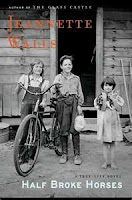I think I've mentioned a few times that I really enjoy memoirs. The two that I've profiled so far have been celebrity memoirs, but I also enjoy reading about average folk: hairdressers, unemployed Prada lovers, the formerly overweight. "Average," though, hardly applies to the characters in Jeannette Walls' memoir/ novels, The Glass Castle and Half Broke Horses.
In The Glass Castle, Walls introduces us to her own childhood, starring her wayward parents, Rex and Rose Mary Walls. Her family is very poor, poorer than poor. Rex and Rose Mary are inventors, artists and above all, adventurers. They drag their children along, nomad-fashion, in the desert Southwest, searching for new excitement. Eventually, their money runs out and they move to West Virginia, where increasingly, the four children learn to fend for themselves, as their parents steal the grocery money and run, or simply rationalize away the crumbling walls and lack of proper clothing. The children eat out of the dumpster and paint their own skin to hide the fact that their clothes have holes. In time, one by one, the children escape to New York and start their own lives there, but Rex and Rose Mary follow them and join the ranks of the homeless and the squatters on the streets of Manhattan.
What is amazing about this book is that it feels both impossible and starkly truthful at the same time. Everything Walls writes has the ring of truth. Though it would be easy to take a bitter, unforgiving tone toward her parents while looking back on what they put her through, she treats them with compassion and understanding. She is able to see them as people with multiple faults and many redeeming qualities, and not in the light of unfit parents, though it's hard for the reader not to see them that way. The story is fascinating, but so are the characters. The writing is full of color and descriptions both enchantingly beautiful and revoltingly ugly.
Half Broke Horses is in some respects a prequel to The Glass Castle, but it's not strictly a memoir. Walls calls it "A true-life novel." It is told from the voice of Jeannette Walls' grandmother, Lily Casey Smith. The plot is based on all the stories Walls heard from her grandmother as a child, as well as Rose Mary's recollections of her own mother. Lily's life takes place in the early 1900s Southwest, primarily on ranches, but also in small frontier towns where she taught children to read and impressed the menfolk with her riding skills. She experienced the march of progress as the towns she lived in filled out and grew up, and her love for horses grew to include a love for driving cars and then a love for flying airplanes. Her plucky actions include accidentally marrying a bigamist; riding solo for 28 days through the desert to reach her first job; and selling bootleg liquor during the Prohibition. Lily is spunky, bright, and the perfect pioneer woman: Annie Oakley meets Laura Ingalls. The book ends with her meeting her daughter Rosemary's (the original of Rose Mary) future husband Rex, and watching her shake her head in disapproval over the lifestyle we read about in The Glass Castle.
I read these books months, maybe years apart, but if you haven't read either yet, I'd suggest trying them in succession. I think it would bring out even more nuance from Lily's, Rosemary's, and Jeannette's characters when experiencing all three of their childhoods in one span of time.
A special thanks to my mother-in-law for introducing me to both of these books!


You write about these books so beautifully Leanne. I'm so glad you enjoyed them as much as I did. I hope other readers do as well. I am so impressed with this blog. You're an amazingly talented woman!
ReplyDeleteThanks, Sowulmom :) Talking about books with you and the OBX crowd was much of the inspiration for this!
ReplyDelete